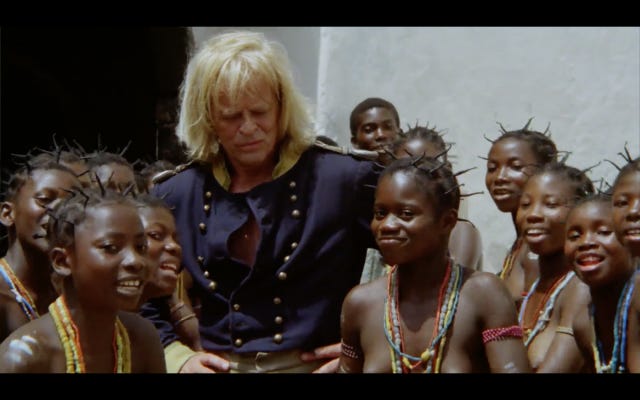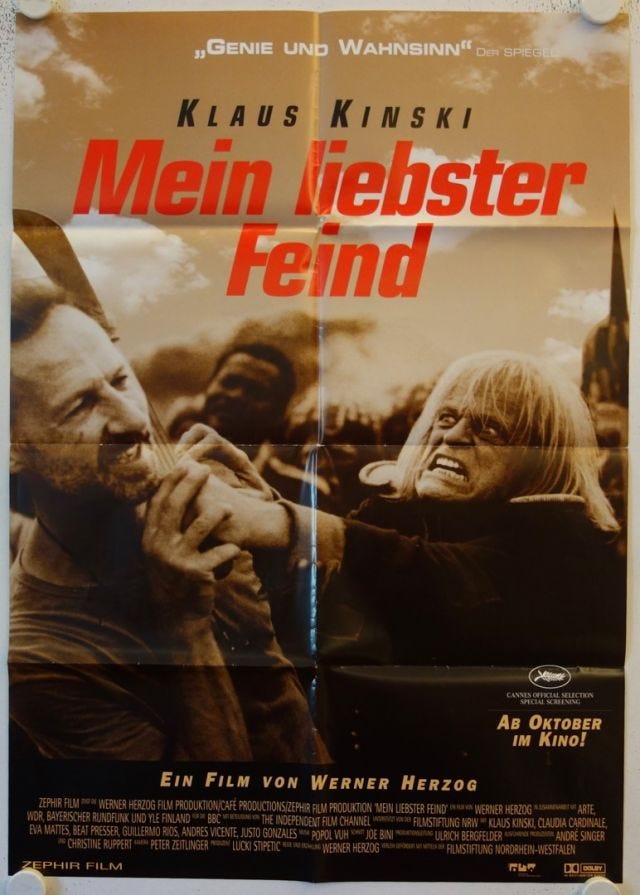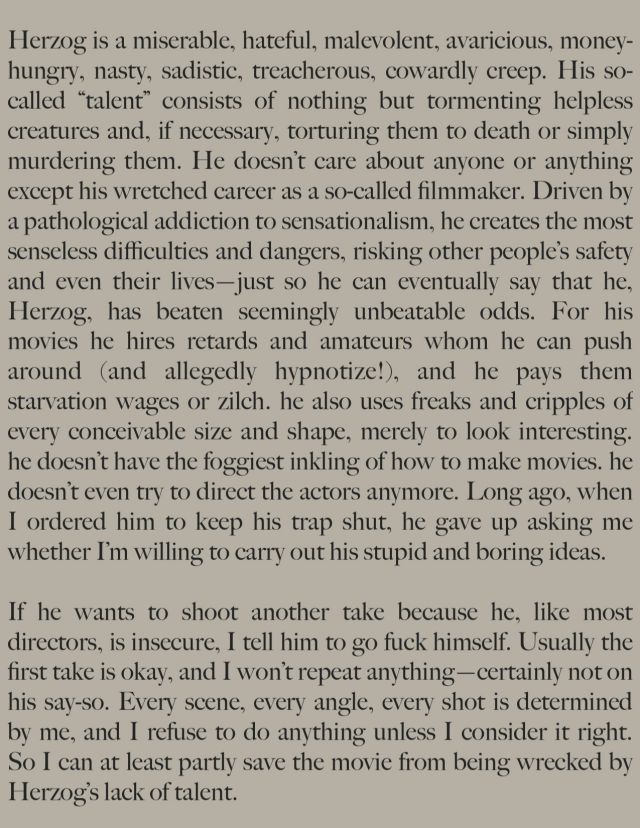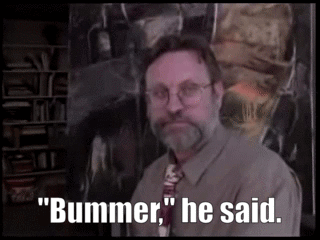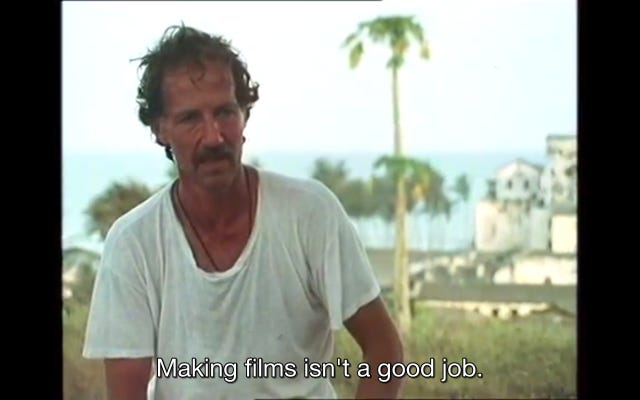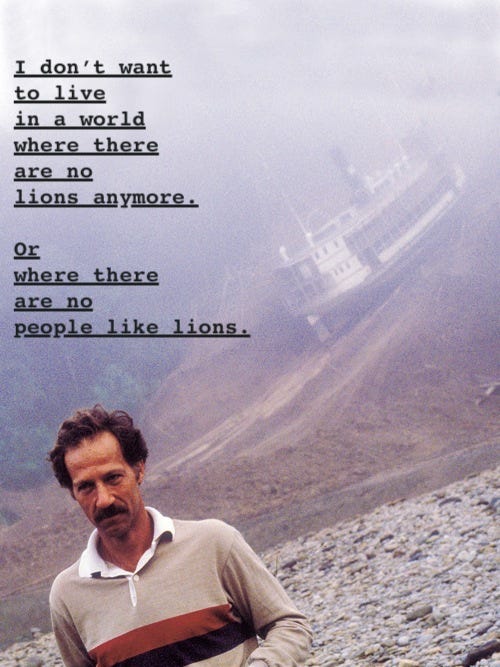Spotlight on Cobra Verde
Werner Herzog's 'great images' and the compelling and deleterious Klaus Kinski
Cobra Verde
Written and Directed by Werner Herzog
(based on Bruce Chatwin's novel The Viceroy of Ouidah)
1 hr 50 mins
1987
Cobra Verde is the final film Werner Herzog made with infamous actor Klaus Kinski (seen arms akimbo in the header photo). The director and actor had a famously hostile partnership. They voluntarily warred with each other during five separate productions over the course of fifteen years (1972 - 1987) - these productions are legendary now not just for their volatile 'behind the scenes' tales, but also for how fruitful and one-of-a-kind their results were - and it was Cobra Verde that brought the productive, conflict-laden director-actor relationship to its trembling brink… "Working with [Kinski] on Cobra Verde was like tracking a wild, unsociable, and rarely seen animal," Herzog has said. "[He] was pretty much out of control..." Bruce Chatwin (author of Cobra Verde's source material) visited Herzog during this production and described the director, whilst on that set, as a "monument of sanity in a cast of nervous breakdowns" (Kinski, meanwhile, gets described as "a sexagenarian adolescent"). In Nomad (Herzog's documentary on Chatwin), Cobra Verde is summarized by Herzog as being about a "Brazilian outlaw [who] steps on the shores of West Africa and becomes the biggest slave trader of his time." Yes, Kinski here plays a slave trader and, yes, he is this film’s 'protagonist'... which already may have some potential viewers feeling like they need a shower... - and it won't ‘help’ matters to know that while the film takes place amidst the slave trade, it is not really 'about' slavery at all... - seeming decidedly dispassionate about certain events, it is as reflective about and sensitive toward particular imagery and consequences as its disreputable no-two-ways-about-it villainous central figure is (which is to say: not much at all)... "The film never denounces slavery," Herzog observes on the film’s commentary track - and indeed any lesson the film feigns provides no relief to viewers... but buckle up because things are only just getting started...
Contrary to the last writer-director in the 'Spotlight,' Todd Solondz (whose cinematic voice is "seemingly impossible to forge/imitate"), Herzog's voice (both literal and artistic) is, today, one popular to parody. "I certainly have humor," Herzog has said, "and it should not be overlooked." The man is a mean meme machine whose presence of personality has only grown over his 50+ year career continually flexing between 'narrative' and 'documentary' features. Herzog quickly found himself an artist of eccentric legends and lore... Yes, he saved Joaquin Phoenix from a car wreck. Yes, he ate his own shoe after Errol Morris completed Gates of Heaven. Yes, he has helmed a Rogue Film School. Yes, he leapt into a cactus patch as a reward for his cast of 'Dwarves.' Yes, he filmed on an active volcano. Yes to being shot during an interview. Yes to the hot take on chickens. Yes, yes and also yes. All of that though, while incredibly entertaining stuff, is only window dressing. More important than any collection of anecdotes is the following: Herzog makes interesting, exceptional films - nearly, it seems, without exception (or so says me, an enthusiastic fan who has, to-date, excitedly viewed 30+ Herzog films)...
A significant part of Herzog's canon of lore concerns this relationship he endured with Kinski. "I qualify as a survivor," Herzog has said (which, considering how 'survivor' would later be associated with this actor, is tragically ironic phrasing...) - and for some time Herzog had no problem 'playing up' this combative-artistic rivalry, able even, for a period, to reminisce on Kinski (who died in 1991) with a degree of levity, making a documentary on the subject entitled My Best Fiend (whose poster picture comes from Cobra Verde's production, flaring Kinski brandishing a sword to Herzog’s exposed throat)...
"Klaus was one of the greatest actors of the century," Herzog said at My Best Fiend's Cannes premiere, "but he was also a monster and a great pestilence. Every single day I had to think of new ways of domesticating the beast." The year after Cobra Verde, Kinski published an absolutely demented autobiography which, among many other things, tears Herzog a new one at every opportunity...
The book's tone is relentless like this - toward Herzog, yes, but also toward pretty much everything and everyone - and, without seeming to miss a beat, Herzog, in regards to passages such as the above, has said that he (Herzog) actually "helped [Kinski] to invent particularly vile expletives" to use for this text (probably, if I were to hazard a guess, whilst on the set of Cobra Verde). "[I was] torn between liking [Kinski] and regretting that he was not murdered," Herzog has said. ...On this topic of 'the desire to murder Kinski': director David Schmoeller has shared his own professional experience with the actor (on a production, in fact, around the very same time as Cobra Verde) via a short 'documentary' entitled, appropriately, Please Kill Mr. Kinski - Schmoeller tells of on-set tension that escalated to fights and eventually to a producer plotting "to kill Kinski for the insurance money"... Schmoeller rushed to inform a second producer of this threat on Kinski's life and that second in-the-know producer delivered, with deadpan indifference, a one word response: “Bummer.”...
Kinski was, by almost all accounts, a monstrous "bastard" in his professional life - a "little prick" entire crews would pleasure in the displeasure of... and in his personal life (it has been revealed in more recent years) he was much, much worse - by all accounts 'abject and an outright example of moral leprosy'... Just last year, Herzog was asked in an interview:
Q: Do you ever think about Klaus Kinski?
Herzog: Not very often. I don’t really miss him. But we have done important work. […]
Kinski sounds abhorrent - a nightmare personified, on set and off - and here, as the titular Cobra Verde, he portrays an abhorrent person. So: this film features a reprehensible, wicked man playing a reprehensible, wicked man. Let this proper context sink in for a moment because alongside that truth there is also the following sentiment that both Herzog and Schmoeller concede: "[Kinski] really was great to watch." Herzog's Kinski-quintet has the actor as centerpiece to each film and so does a tremendous job demonstrating the draw. Each of those five titles feature a compelling performance…
[^^Aguirre, the Wrath of God (1972)]
[^^Nosferatu the Vampyre (1979)]
[^^Woyzeck (1979)]
[^^Fitzcarraldo (1982)]
Unflinching, ever-convincing intensity rotating between the comic, the caustic, and the cosmic... With Cobra Verde, specifically, Herzog says there was "a certain stylization Kinski forced on the film that is vaguely reminiscent of Spaghetti Westerns.” By the end of his career, Kinski was quite familiar with how to function in a 'Spaghetti Western' (his non-Herzog filmography is replete with titles in that genre) and Cobra Verde viewers will notice quickly that Herzog is correct in his observation - there is a perverted 'Western slant' to Kinski's performance (a sort of 'Kinski-sploitation') - and Herzog manages to choose scenery that winds up supporting this perversion... Scenery has always been important to Herzog. In his Portrait (a short documentary), the director emphasizes landscapes as not just background but as "the figure of the soul"...
...and viewers will witness this in action via the eccentric, unpredictable backdrops Herzog gives to Kinski's eccentric, unpredictable (and dangerous) characters - yes in Cobra Verde, but also in each of the five films...
...and from here the Kinski performances take on what Herzog might refer to as "the bliss of evil"...
[^^Consider Paul Thomas Anderson's There Will Be Blood, with Daniel Day Lewis' opportunistic evil bliss]
...a megalomaniacal mania of fantastical proportions...
[^^Herzog's own Bad Lieutenant: Port of Call New Orleans with Nicholas Cage blissing out on evil]
...and Herzog's films with Kinski are an exciting display of narrative dynamism that has been (in my experience) frankly hard to top.
In this century we've had perhaps two or three people of Kinski's calibre. There’s no one else like him. He's a wonder of the world. [...] There's a duty, a great duty over me, since no one else can do it. I have to be able to take it on. I want to be a good soldier of cinema.
Herzog spoke the above while filming Cobra Verde - but the idea of being a 'good soldier of cinema' has been a career-long mantra for him. Years before this film, in 1980, while speaking about his struggling Fitzcarraldo production, Herzog said:
Years later, in 2013, after the passing of film critic Roger Ebert (to whom Encounters at the End of the World was dedicated), Herzog called Ebert "the good soldier" for "[holding] the outpost.” (Brian Tallerico, on Ebert's site, by the way, writes of Cobra Verde, "By the end [it becomes] a film that could have been made by no one else starring no one else.")... Years later still, when receiving an award in 2018, "Herzog introduced himself [...as] 'a soldier of cinema'" and in 2019, still 'holding that outpost,' Herzog continues to blow the bugle for the 'good solider' - having explained 'soldier of cinema' to mean incorporating "loyalty, courage, perseverance [and] a sense of duty"... It is this sentiment of 'duty' that fuels such Herzog statements as,
And while Kinski may have had 'westerns' in mind, Herzog, I don't think, ever consciously plays off any formula - the man has said when he was young he had to "invent cinema" for himself - and indeed practically every film of his I've seen contains that spark of originality. Herzog is an artist built with the bones and muscle of curiosity, thus he makes films not limited by bounds of 'genre' or 'reality' or even 'common sense stories.' His 'fiction' films contain things that are 'real' (he truly had an entire cast hypnotized... a boat truly was hauled over a mountain... take your pick...) and his 'documentaries' 'make things up'...
[^^Bells From the Deep (1993)]
…Dreams become realities and realities become dreams - and thus Fitzcarraldo’s ship, being pulled over the mountain, exists in a 'neitherland,' beyond, outside, and a part of both worlds, fantasy and reality...
"You can tell the difference," Herzog says in Burden of Dreams (Les Blank's outstanding documentary about Fitzcarraldo's production). "That this is not a plastic boat and that this slope is no joke at all."
This sort of extravagant, ambiguous metaphor gets at what Herzog might call "ecstatic truth." In his review of Cobra Verde during its 2007 US release (yes, the film wasn't given a US release until 20 years after it was made), AO Scott describes his experience with the film as follows:
This is the 'ecstatic truth' effect Herzog strives for.
The widely talked of 'Herzog legends and lore,' while wildly amusing, are but by-products of this artist spending decades trying to achieve "images" (which Herzog himself says "we are starved for")... and at one time this meant volunteering, again and again, to wrangle Kinski (who Herzog viewed as some sort of 8th Wonder of the World) into a displayable state...
[The above screenshots are from Steff Gruber's 'making of Cobra Verde' documentary Location Africa. It is Cobra Verde's equivalent of the aforementioned Burden of Dreams - meaning: the documentary acts as an essential piece of the original film's viewing experience. Like Hearts of Darkness to Francis Ford Coppola's Apocalypse Now, the absolutely wild feature is illuminated/emphasized all the much more after witnessing the absolutely wild circumstances of its production...]
There is no escaping Kinski as the center of Cobra Verde's storm (the actor is in practically every sequence) - and there is also no escaping the fact that Kinski was a storm himself - his character here (who is, as in other Herzog projects, a flamboyant, dangerous white man with 'dreams of grandeur' in a foreign country - all scored to a Popol Vuh soundtrack) is almost the sole realized individual, with the rest of the film working as a sort of maniac's blur of time and people and events. And those tall tales that have accumulated around Herzog (only a fraction of which have been mentioned in this write-up) are really just demonstrations of his effort to maintain a reputable 'good soldier of cinema' standing - so when Herzog says something like "if I knew that tomorrow a meteorite would destroy our planet, I would start shooting a new film today," I, for one, am inclined to believe him. ...So this is it. These are some of the starting points that set the stage for the complicated macabre show that is Cobra Verde. Welcome aboard, soldier...
For options on how to stream/rent Cobra Verde, click here. More specifically: as Cobra Verde was filmed in a mix of languages, there exist different audio tracks. The German language dub with English subtitles (**which I would say is the preferred experience**) is currently streaming for free through both TUBI and ShoutFactoryTV. Alternatively, the English dub version has also been uploaded to YouTube, albeit with Spanish subtitles built in).
Essential bonus content: Location Africa (the aforementioned documentary on Cobra Verde's production) - which unfortunately appears to be completely unavailable for virtual streaming (aside from a YouTube upload lacking English subtitles)... However! **If interested in viewing this 'making of,' send a request in the form of an emailed reply to this essay and a direct link to stream/download a version with English subtitles will be provided.**
Meryl Anady is on Twitter here.
[This essay was originally sent to subscribers on March 19, 2021]
![Spotlight on [Cinema]](https://substackcdn.com/image/fetch/$s_!NN_D!,w_80,h_80,c_fill,f_auto,q_auto:good,fl_progressive:steep,g_auto/https%3A%2F%2Fbucketeer-e05bbc84-baa3-437e-9518-adb32be77984.s3.amazonaws.com%2Fpublic%2Fimages%2F78417b1a-402f-4c53-8502-eb81a87cde85_346x346.png)

![Spotlight on [Cinema]](https://substackcdn.com/image/fetch/$s_!NN_D!,w_36,h_36,c_fill,f_auto,q_auto:good,fl_progressive:steep,g_auto/https%3A%2F%2Fbucketeer-e05bbc84-baa3-437e-9518-adb32be77984.s3.amazonaws.com%2Fpublic%2Fimages%2F78417b1a-402f-4c53-8502-eb81a87cde85_346x346.png)

